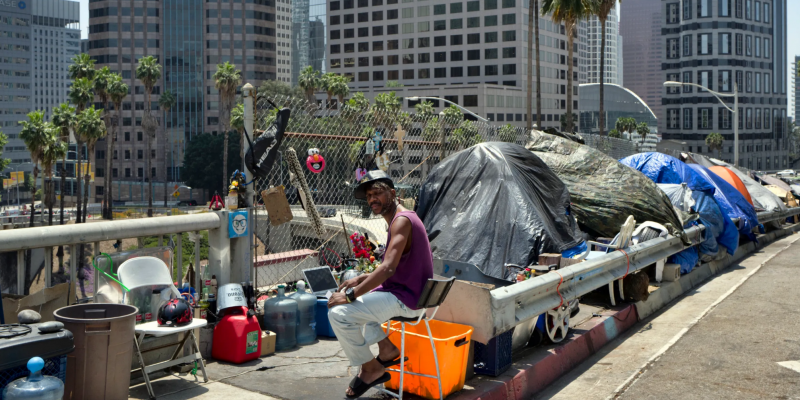Austinites will vote May 1 on whether the city should reinstate a homeless camping ban that was removed by an all-Democratic city council in June 2019.
The city clerk’s office announced the petition to put the question on a ballot was successful because the group leading the effort, Save Austin Now, received the required number of verified signatures. Last month, the nonprofit submitted 27,000 signatures of which the clerk determined more than 26,000 were valid. It needed 20,000.
Now that the signature verification process has been completed, the city council is required to approve ballot language no later than Feb. 12.
City councilman Greg Casar, who opposes the ban, argues it is a Republican Party effort, “which does absolutely nothing to solve homelessness. No one will be housed by this misguided effort, but plenty of people will be jailed by it. A majority of Austinites want to see people housed, not persecuted, and we need to push back on this cruel strategy at the ballot box in May.”
But advocates for the ban argue they want Austin streets safe and kept clean from needles, feces and tents in public places. Save Austin Now was co-founded in August 2019 by Republican Matt Mackowiak and Democratic activist Cleo Petricek, founder of Project S.A.F.E.
While many petitioners are apolitical or not affiliated with a party, proponents for the ban note it was repealed by an all-Democratic city council and mayor.
After the city council’s decision in June 2019, widespread public backlash erupted. Parents of school children, college students and police expressed concerns about a more dangerous public environment and the potential for an explosion of tent cities springing up in the downtown capital area.
After eliminating the ban, violent crime increased by double digits, and homicides increased by 64 percent in 2020 from the previous year.
Last year, Gov. Greg Abbott encouraged Austinites to sign the Save Austin Now petition, arguing doing so would “… improve the homeless situation in Austin. Austin is your city and you have the power to determine how it’s run.”
According to an Austin/Travis County July 2020 Point-in-Time count report, the cause for homelessness is complex, but largely driven by unaffordable housing prices. The count last year identified 2,500 homeless people living in Austin.
“The lack of affordable housing, rapid re-housing, and permanent supportive housing resources is an important obstacle to ending homelessness in Austin/Travis County,” the report states.
Austin’s population grew by nearly 25% between 2010 and 2019. The city is projected to continue to grow at a similar rate in the next 10 years, the report states. Population growth, the report argues, has contributed to a dramatic increase in housing costs due to increased demand.
With increased demand, home sales also increased by 84% from 2010 to 2019, resulting in a 64% increase in the median home price, according to Austin Board of Realtors 2019 data. While Austin was growing, those at the lower-to-middle economic level were being squeezed out, the report states.
As of July 2020, Austin is the least livable U.S. city to live for minimum wage earners, according to Move.org. Within one year, Austin dropped 18 spots from its previous year’s ranking in the same survey. Austin is also the most expensive city to live in in Texas, the report found, based on its cost-of-living analysis.
The petition to amend City Code Section 9-4-11 calls for the city “to restore generally the provisions of the Austin City Code that were in effect on June 19, 2019 prior to the City Council’s action.” It also asks to expand the previous area in which solicitation was prohibited during the evening and nighttime hours and that the geographical area also include the campus of the University of Texas at Austin and nearby areas through which students travel to and from campus.
“If Austin doesn’t reinstate the ban on homeless camping, the state will do it for them,” Gov. Abbott said in January. “Contrary to what Austin leaders think, no one has a right to urinate & defecate wherever they want. Homelessness promoted by Austin has also endangered public safety.”
Abbott also said he would be announcing a statewide plan to address homelessness, which will include a ban on camping, “as well as other ideas to make sure that Texas will be able to effectively and aggressively address the homeless situation.”
A new homeless strategy officer hired by the city, Dianna Grey, says a housing-first model adopted by Houston is the best way to address Austin’s problem. Using this model, from 2011 to 2019, Houston’s homeless population decreased by 55 percent, from 8,400 to 3,800. The city has helped house 18,000 people since the Housing First revamp began, even after homelessness increased by nearly 15 percent after Hurricane Harvey in 2017.
The Austin City Council has in the last year spent millions of dollars purchasing four hotels to house a few hundred people, which critics have argued is not the best use of taxpayer money or practical as a long-term solution.
Grey’s plan will be submitted to the city manager’s office March 4, which includes reviewing vacant land and properties as potential shelter locations, among other recommendations.
Advertisement
Advertisement

